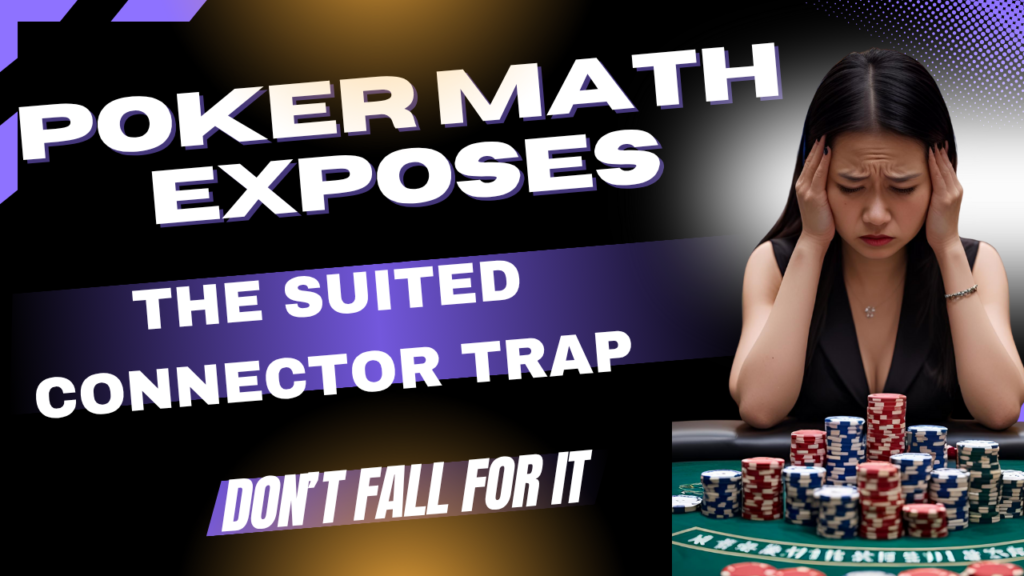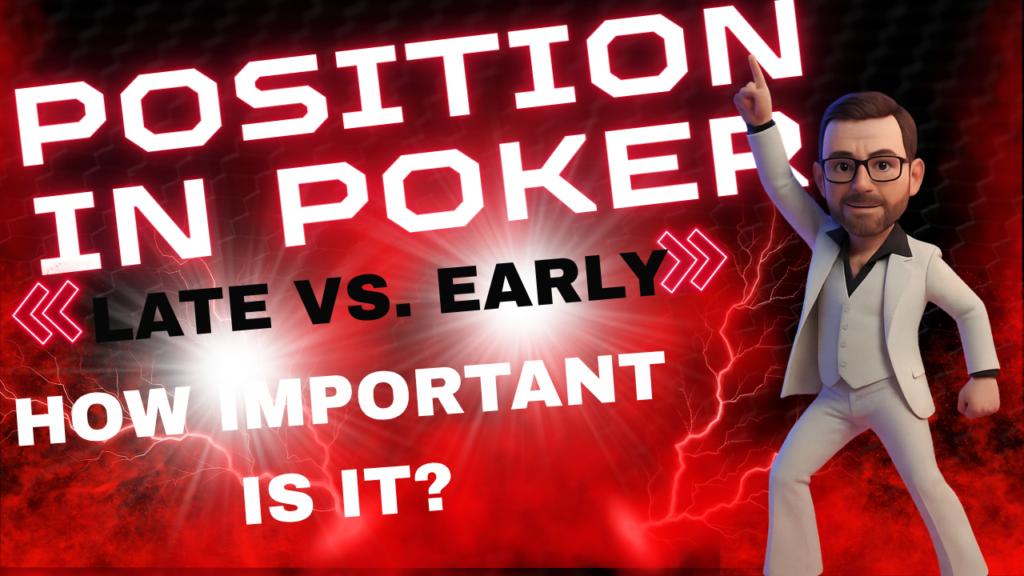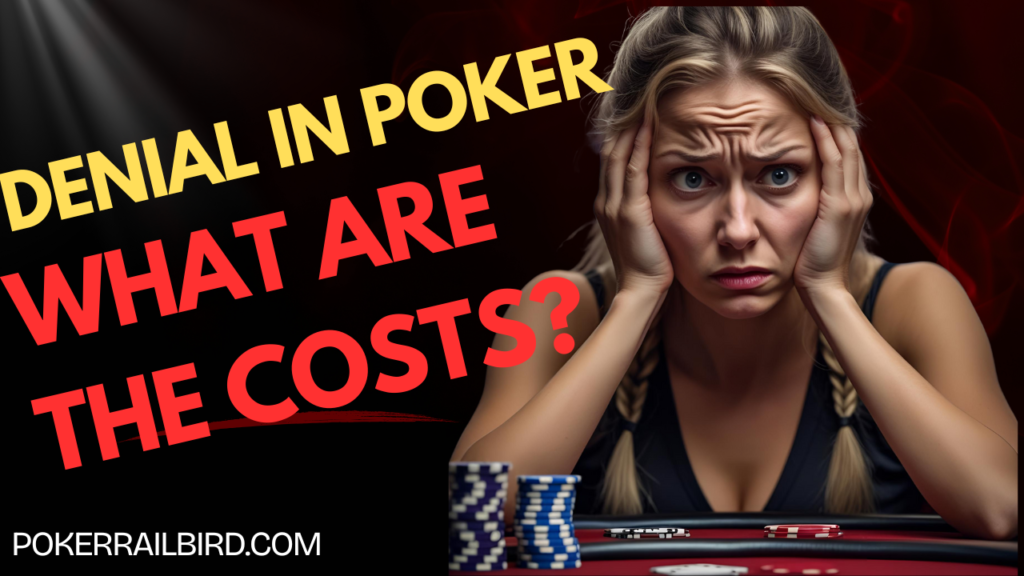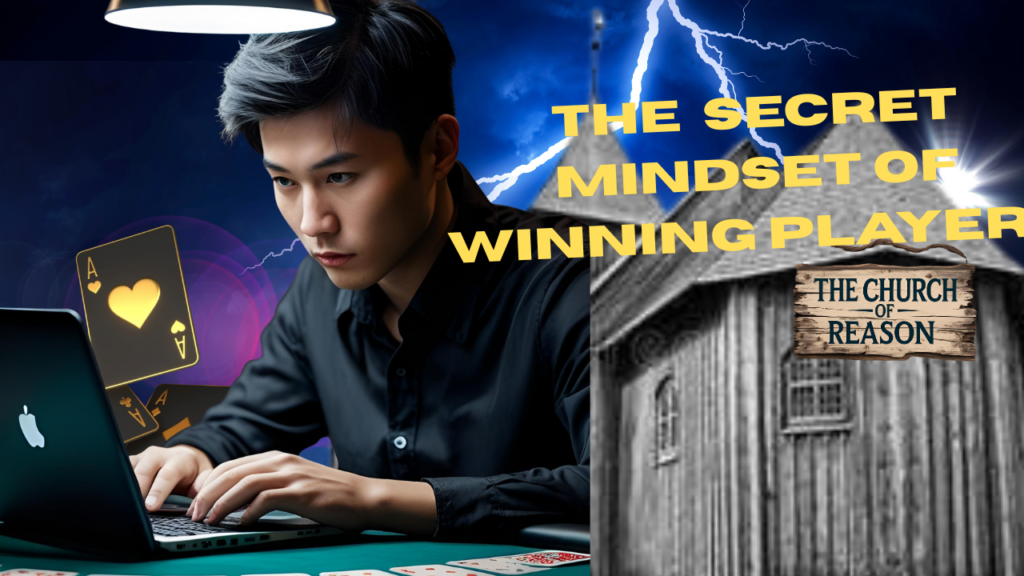DEADLY SIN NO. 2: DENYING REALITY
"THE MOMENT YOU STOP FACING THE TRUTH IS THE MOMENT YOU START LOSING"
There’s no faster way to destroy your poker game than lying to yourself.
Whether it’s pretending your bluff almost worked, ignoring that you’re outmatched at the table, or convincing yourself you’re just “running bad,” denial is the disease—and the losses are the symptom.
WHAT IS DENIAL iN pOKER
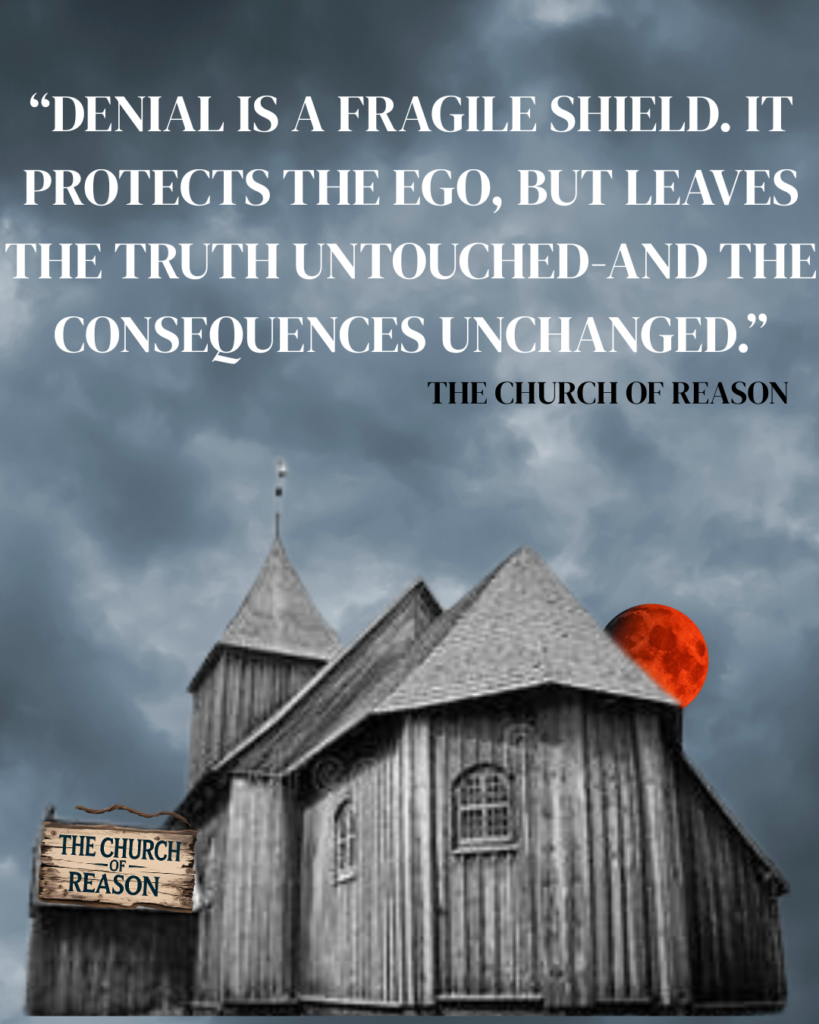
Denial in poker is the silent saboteur. It’s what happens when we refuse to accept the truth—about a hand, a player, a session, or even ourselves. We tell ourselves that bet wasn’t that bad, that we weren’t tilted, that we didn’t chase, that this game isn’t too tough. But underneath all that rationalizing is one simple fact: we know better.
This is the second most destructive sin in poker because it targets the foundation of your decision-making. When you’re in denial, you’re not thinking clearly. You’re protecting your ego instead of protecting your stack.
And here’s the catch—it’s not just beginners. Even experienced, disciplined players fall into denial from time to time. It doesn’t always come with flashing lights. Sometimes it whispers. Sometimes it hides behind logic or emotion. But if you don’t catch it, it will catch you.
SIDEBAR: WHY WE DENY REALITY - BEYOND POKER
Denial isn’t just a poker blunder—it’s a universal defense mechanism that all humans use to shield themselves from psychological pain.
COGNITIVE DISSONANCE
When our beliefs clash with reality, our brain feels discomfort—and we often choose internal consistency over truth.
Case study: In the 1950s, psychologist Leon Festinger infiltrated a doomsday cult expecting world’s end. When it didn’t happen, members doubled down on their beliefs by claiming their faith saved humanity—classic cognitive dissonance
DEFENSE MECHANISM
SELF-SERVING BIAS
OSTRICH EFFECT
MOTIVATED REASONING
As described by Harvard Health, denial can serve as a temporary buffer—protecting you from anxiety long enough to adjust Harvard Health. But once habitual, it becomes maladaptive.
We naturally attribute success to our skills—and failures to external factors. This bias spares our ego—but further entrenches denial
Named after the myth that ostriches bury their heads in the sand, people often avoid information that challenges their beliefs, even when it matters most
Sometimes we don’t seek truth—we seek comfort. We filter facts to reach desired conclusions rather than accurate ones.
Denial is powerful—but not unbeatable. Awareness is the first step. Recognizing your own denial lets you break the cycle before the consequences do.
KNOWLEDGE DENIAL
“I don’t need the math—I play the player.”
This is one of the most widespread and dangerous forms of denial in poker. Many players downplay or outright ignore the role of math, even though math is the very foundation of the game. Pot odds, equity, fold equity, expected value—it’s all math. You don’t need a Ph.D., but you do need to understand the basic formulas and probabilities that drive sound decisions.
But here’s the real kicker: many players don’t just lack knowledge—they deny its importance altogether. They convince themselves that instincts, reads, or “playing the player” is enough to win long term. It’s not. Even the world’s leading expert on poker psychology, Zachary Elwood, has said that people-reading—though useful—can’t consistently beat the game on its own.
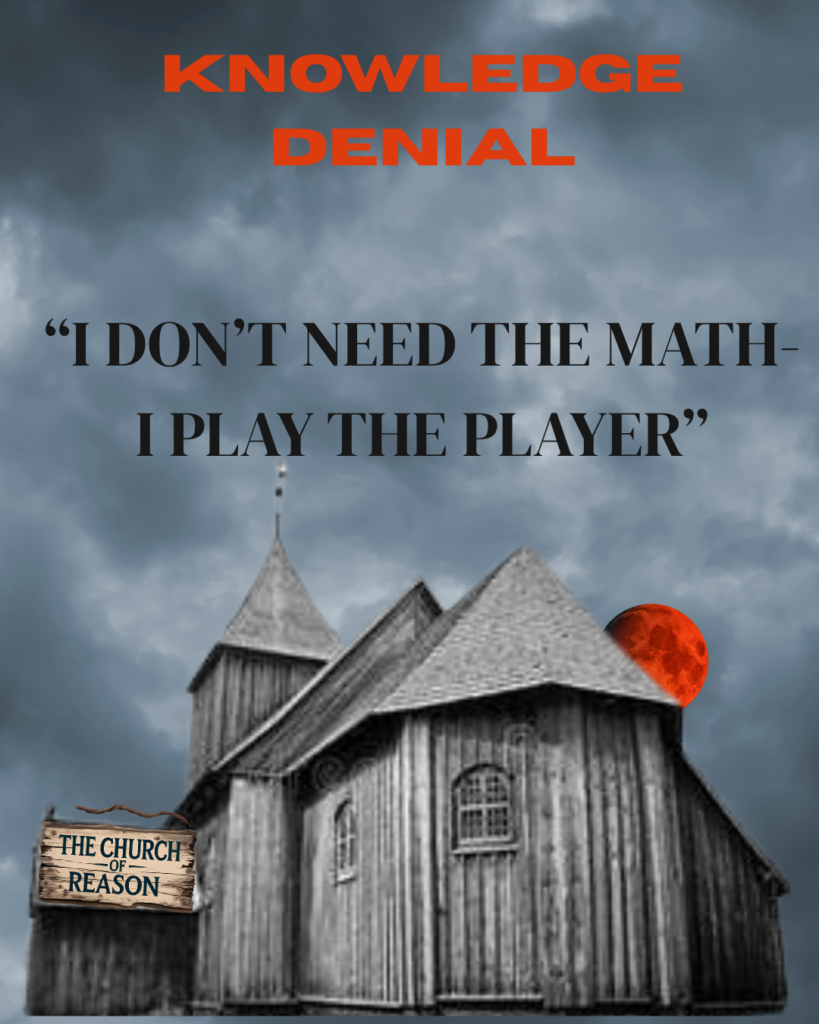
Worse still, many players overestimate their ability to detect tells or manipulate opponents, while remaining completely unaware of their own mathematical leaks. That’s knowledge denial—and it’s a silent bankroll killer.
EMOTIONAL DENIAL
SKILL LEVEL DENIAL
Yes, you are. And everyone else can see it but you.
Emotional denial in poker is subtle. It’s not always loud or explosive. It’s the decision to stay at the table after a big loss. It’s playing too many hands. It’s betting without a plan, raising out of frustration, or calling just to “prove a point.” You tell yourself you’re fine—but your actions say otherwise.
Tilt doesn’t just destroy a hand—it corrupts your entire session. Denying you’re on tilt is like denying you’re drunk while holding your fifth shot. You might think you’re in control. But your judgment is already gone.
“I’m better than these players.”
Confidence becomes dangerous when it crosses into delusion. You see it all the time—players who consistently lose but chalk it up to “variance” or bad luck. They ignore feedback, avoid study, and double down on poor habits.
In reality, they aren’t unlucky—they’re in denial. Denial in poker often looks like stubbornness or inflated ego. But underneath, it’s fear. Fear of admitting you’re not as good as you thought. And unless you’re willing to face that truth, you’ll never get better.
TABLE DIFFICULTY DENIAL
FATIQUE & DISTRACTION DENIAL iN pOKER
“I can beat this table.”
Even when it’s full of sharks, pros, or aggressive killers? Table selection is one of the few things you can fully control in poker. Yet many players sit down at bad games out of pride, laziness, or stubborn optimism.
They lose steadily, but refuse to get up. Why? Because admitting the game is too tough would mean admitting a limitation—and denial won’t let that happen.
Knowing when you’re outmatched is not a weakness. It’s a strength.
I’m still sharp. I can keep playing.”
No, you can’t.
Poker is mentally exhausting, even when you’re not aware of it. When you’re tired, distracted, or emotionally taxed, your decision-making suffers. But the worst part? You’ll deny it. You’ll tell yourself you’re playing fine, even as your edge erodes hand by hand.
This form of denial in poker is especially dangerous because it hides behind the illusion of discipline. “Grind it out,” you tell yourself. But grinding while fatigued is like sprinting through quicksand—you’re not going anywhere, and you’re burning energy doing it.
DENIAL KILLS LONG-TERM STRATEGY
Denial in poker isn’t just a short-term leak—it’s a long-term assassin.
It doesn’t always cost you a single hand. Sometimes it costs you your entire progression as a player. Denial keeps you stuck in place while others evolve. And while it may feel comfortable in the moment, it’s the comfort of sinking in quicksand.
DENIAL BLOCKS GROWTH
DENIAL IN POKER LEADS TO POOR GAME SELECTION
You can’t fix what you won’t admit. Denial puts up a wall between where you are and where you need to go. If you’re losing and blame bad luck instead of bad decisions, you’ll never identify what needs to change. If you convince yourself your reads are infallible or your strategy is flawless, you’ll miss every opportunity to improve. Progress starts with brutal honesty—and denial is the enemy of honesty.
The ego says, “I can beat anyone.” The win rate says otherwise.
Poker is a game of edge, and if you consistently sit in games you can’t beat—whether due to pride or blindness—you’ll never realize your potential. Denial convinces you that table selection is for cowards, when in reality, it’s the most strategic move you can make. The best players hunt value. The worst ones deny they need to.
DENIAL DESTROYS BANKROLL DISCIPLINE
DENIAL MAKES DATA & OBSERVATION MEANINGLESS
Denial in poker often masquerades as “giving it one more shot” or “playing through it.” But in reality, it’s the quiet justification for bad bankroll management. You tell yourself the downswing isn’t real, the buy-in isn’t too much, or you’re “due for a heater.” All of it sounds logical when you’re tilted. But it’s just denial wearing a different hat.
Poker is a game of patterns—yours and your opponents’. But if you’re constantly rewriting the narrative to protect your ego, you’ll never see the real picture. You’ll overlook red flags, misread player types, and ignore statistical evidence. Denial in poker turns your powers of observation into tools of self-deception.
Denial doesn’t just slow down your progress—it reroutes your entire career into a dead end. The sooner you remove it, the clearer your decisions become—and the faster your win rate improves.
HOW TO BREAK THE HABIT
Denying reality in poker is like playing blind—it might feel safer in the moment, but it guarantees long-term failure. To break the habit, you need more than self-awareness. You need a system.
Here’s a practical guide to help you face the truth and start improving for real:
START A STRUCTURED STUDY ROUTINE

Denial often thrives on ignorance. If you don’t understand pot odds, equity, hand ranges, or reverse implied odds, you’re far more likely to make excuses or emotional decisions. Combat this by:
- Watching instructional videos from respected educators.
- Reading modern strategy books on poker math, decision theory, and game theory.
- Practicing with hand history solvers or poker equity tools like Flopzilla or Equilab.
Make it a habit: 30 minutes of poker study a day is more valuable than 5 hours of undisciplined play.
UNDERSTAND THE PSYCHOLOGY BEHIND DENIAL iN POKER
To eliminate denial in poker, you must understand why humans deny uncomfortable truths in the first place. Denial is a defense mechanism—one designed to protect ego, identity, and self-worth.
Here are some expert-recommended books that explore denial and self-deception in powerful ways:
📘 Mistakes Were Made (But Not by Me) by Carol Tavris & Elliot Aronson
→ A deep dive into cognitive dissonance, self-justification, and denial in everyday life.
📘 The Elephant in the Brain by Kevin Simler & Robin Hanson
→ Explores how much of our behavior is guided by hidden motives, including denial.
📘 Denial: Self-Deception, False Beliefs, and the Origins of the Human Mind by Ajit Varki & Danny Brower
→ A fascinating theory that denial may be biologically hardwired into us.
📘 Emotional Intelligence by Daniel Goleman
→ Teaches how to recognize and regulate emotions—essential for avoiding denial in poker and life.
ADDITIONAL TOOLS TO HELP WITH DENIAL IN POKER
- Develop Real-Time Checkpoints
Build a habit of asking yourself reflective questions mid-session:
- “Am I playing solid poker—or chasing?”
- “Is this hand part of my range—or part of my fantasy?”
- “Would I make this play if I were winning instead of losing?”
These mental checkpoints interrupt autopilot mode and force you to reassess with clarity.
- Join a Poker Study Group
Find one or two serious players who want to improve. Exchange hands, talk through lines, review sessions together. The outside perspective cuts through personal bias—and reveals where denial may be distorting your view.
- Keep a Poker Journal
At the end of each session, write down:
- The best decision you made.
- The worst decision you made.
- A moment when you felt ego, tilt, or denial creeping in.
Over time, you’ll start to see patterns—and you’ll gain the power to break them.
Denying reality in poker isn’t just a leak—it’s a wrecking ball to your potential. Facing the truth, no matter how uncomfortable, is the only path forward. Don’t just admit mistakes—study them. Learn why they happened, and build the tools to stop repeating them.
FINAL THOUGHTS: DENIAL IS A LIAR
Denial doesn’t whisper—it lies. It tells you that everything’s fine when your bankroll is bleeding. It insists the game is beatable when it’s clearly not. It convinces you to chase, to justify, to ignore, to blame.
But poker doesn’t care about your narrative. It only rewards truth.
The best players aren’t perfect—they’re just honest. Honest about their mistakes. Honest about their limits. Honest about what needs work. That’s how they get better. That’s how they grow.
Denying reality in poker is the second most destructive sin for a reason: it prevents correction. It stops you from evolving. And if you won’t evolve, poker will leave you behind.
So ask yourself:
- Are you calling it “variance” when it’s really bad play?
- Are you saying “he always has it” because you’re scared to bet?
- Are you showing up tired, distracted, tilted—and calling it discipline?
There’s no shame in facing the truth. In fact, it’s the only way out of the fog. The moment you stop denying reality is the moment your game starts to transform.
And that’s the moment you stop losing for the wrong reasons—and start winning for the right ones.
.

